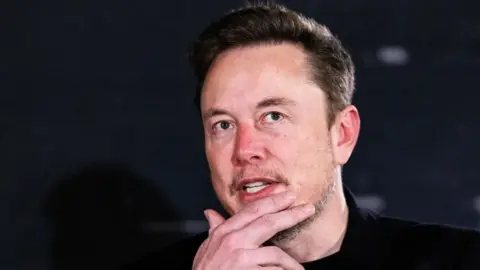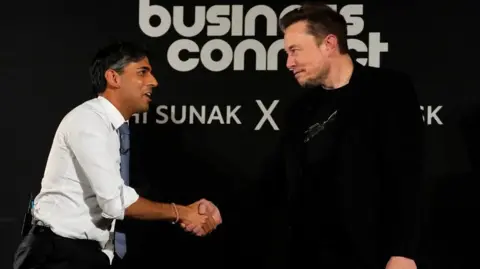Elon Musk's curious fixation with Britain
 EPA
EPAIn 2012, Elon Musk had just completed a business trip to London and Oxford. "Just returned… I met with many interesting people," he wrote on Twitter. "I really like Britain!"
Fast-forward to 2024, and Musk's views on Britain are a little different.
"Civil war is inevitable" … "Britain is going full Stalin"… "The people of Britain have had enough of a tyrannical police state".
These are just some of his recent comments on X, as he renamed the site after he bought it.
He has repeatedly got into spats with politicians including Prime Minister Sir Keir Starmer, he has amplified voices on the right and far-right online and is in talks to donate to Reform UK, according to the party's leader Nigel Farage.
So why has Musk's relationship with America's closest ally apparently soured and what, if anything, does he hope to achieve?
We would love to ask him ourselves but he didn't respond to our requests for an interview.
His X timeline offers some clues though.
The self-proclaimed "Chief Troll Officer" often exaggerates in an ambiguous way, unclear if he's being sincere or ironic.
When he writes, "Is this Britain or the Soviet Union?" he doesn't really mean that Britain is a totalitarian Communist state but also, he sort of does. Often he reposts content with just a single word - "interesting" - or an emoji, rather than going into details.
In recent years, however, Musk watchers have noticed that the kinds of things he boosts to his 200 million followers tend to come from a particular place: a world view that is libertarian and "anti-woke", against progressives and centrists.
'What's happening in the UK?'
The shift was explicit during last summer's riots following the horrific killing of three girls at a dance class in the north-west England town of Southport.
False rumours about the attacker were circulated on X, including by far-right accounts which had been unbanned since Musk took over the company two years before.
As a protest turned violent and rioting flared, Sir Keir issued a warning: "To large social media companies, and those who run them - violent disorder, clearly whipped up online, that is also a crime.
"It's happening on your premises, and the law must be upheld everywhere."
Musk replied with one word: "Insane".
 PA Media
PA MediaLater, he would state that "civil war is inevitable" and spread a false message from the leader of a far-right party, claiming that Sir Keir was considering building detainment camps for rioters on the Falkland Islands. By the time he deleted the post, it had been viewed more than a million times.
Musk also criticised Britain's "prison overcrowding situation" on Joe Rogan's podcast - watched 19m times on YouTube - saying we should "make Orwell fiction again", a reference to George Orwell's writings about dystopian society.
While free speech is not Musk's only big issue - he appears to care a lot about existential questions around the future of humanity too - it's a subject that the Tesla, SpaceX and X owner has repeatedly returned to.
Just a few weeks ago, in response to a tweet from a right-wing American influencer, making an exaggerated claim about a report from the last government on radicalisation, he commented: "What is happening in the UK?"
And he may be planning to do more than tweet. He was recently pictured with Farage and Reform UK treasurer Nick Candy, amid reports he is preparing to donate a large sum of money to the party.
Why Musk cares about Britain
Musk's interest in UK affairs could be a reflection of how his own political beliefs have changed. He previously described himself as a centrist and even donated to Hillary Clinton's campaign, but now he talks a lot about the "woke mind virus".
According to interviews he's given and a recent biography, the gender transition of one of his children from male to female - and that child, Vivian Wilson, subsequently cutting him off from her life - appears to be one of the key turning points.
Winston Marshall, a former Mumford & Sons guitarist turned podcast host and right-leaning political commentator whose father jointly owns TV channel GB News, speculates that Musk could be picking fights because "he cares very deeply about the UK".
"Britain is the birthplace of liberal democracy, of many of the great philosophies that underpin America," Marshall says.
"So then he looks over to the UK and he sees what's been going on for several years, but which is now crescendoing after the August riots, with many, many people being given long jail sentences for literally Facebook memes in some cases."
"Facebook memes" sounds pretty harmless but these examples include - for instance - a three-month jail sentence for a person who posted a meme along with the caption "let's [expletive] riot" on a Facebook group with "riot/protest" in the name during the Southport disorder.
 Reuters
ReutersSome question whether the tycoon is really as committed to free speech as he claims.
The Center for Countering Digital Hate, which scrutinises social media companies, was critical of Musk's tenure at X - prompting the tycoon to sue, accusing the organisation of misusing data and scaring off advertisers. The case was thrown out by a US judge.
Its CEO Imran Ahmed called the incident "indicative of the mindset of a man who simply cannot understand that freedom of speech is a freedom afforded to all, not just to him".
Other critics have pointed out that Musk has been careful not to criticise the president of China, a country where Tesla has huge business interests, despite Beijing's well-documented culture of censorship.
He has far less at stake, business-wise, in Britain, but the country could still affect his bottom line via the Online Safety Act, passed by Parliament in late 2023. It will allow regulator Ofcom to issue huge fines to social media companies if they're found to have certain types of illegal content on their platforms.
Andrew Chadwick, professor of political communication at Loughborough University, explains that while some provisions in the bill are uncontroversial, "where it gets a bit more tricky is where this illegal content blurs across into what we might call the kinds of disinformation or misinformation that we see circulate on a daily basis on social media platforms".
This could include "racially or religiously aggravated public order offences or the incitement of violence," he says.
The Act comes with some potentially huge punishments – a fine of up to 10% of qualifying worldwide revenue.
Could it be that Musk is worried about Britain biting off a chunk of X's revenues – or even, as the Act allows for in some circumstances, blocking access to the site in the UK?
Defenders of the Act argue that it's got nothing to do with censoring free speech. Gawain Towler, former head of press for Reform UK, says while Musk might not have "a forensic knowledge of all the details of backbench committee" he does "see the bigger picture" – what Reform activists and others describe as a creeping culture of censorship.
"You don't have to concentrate always on the trees. And I think Musk sees the forest quite, quite well," he adds.
Nobody can read the mind of the world's richest man.
But it's clear that Musk has funnelled his vast wealth into influence and is now exporting his values – including a mainstream American view of free speech and largely unfettered capitalism – around the world.
And one thing's for sure – he's not yet done with the UK.
